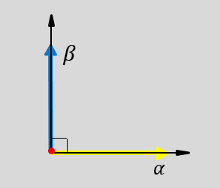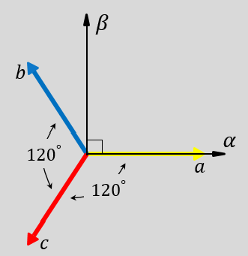Inverse Clarke Transform
Implement αβ0 to abc transform
Libraries:
Simscape /
Electrical /
Control /
Mathematical Transforms
Description
The Inverse Clarke Transform block converts the time-domain alpha, beta, and zero components in a stationary reference frame to three-phase components in an abc reference frame. The block can preserve the active and reactive powers with the powers of the system in the stationary reference frame by implementing an invariant power version of the inverse Clarke transform. If the zero component is zero, the components in the three-phase system are balanced.
If you have a license for Motor Control Blockset™ toolbox, you can use this block for embedded implementation. Use the
Number of inputs parameter to specify either two or three
inputs. When you set the Number of inputs parameter to
Two inputs, the block accepts two signals out of the
three phases (abc), automatically calculates the
third signal, and outputs the corresponding components in the αβ reference frame. (since R2025a)
The figures show:
Balanced ɑ, β, and zero components in a stationary reference frame

The direction of the magnetic axes of the stator windings in the stationary ɑβ0 reference frame and the abc reference frame

The time-response of the individual components of equivalent balanced ɑβ0 and abc systems

Equations
The block implements the inverse Clarke transform as
where:
α and β are the components in the stationary reference frame.
0 is the zero component in the stationary reference frame.
a, b, and c are the components of the three-phase system in the abc reference frame.
The block implements this power invariant version of the inverse Clarke transform as
Ports
Input
Output
Parameters
References
[1] Krause, P., O. Wasynczuk, S. D. Sudhoff, and S. Pekarek. Analysis of Electric Machinery and Drive Systems. Piscatawy, NJ: Wiley-IEEE Press, 2013.
